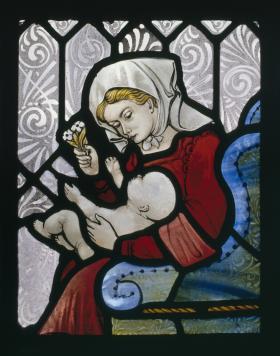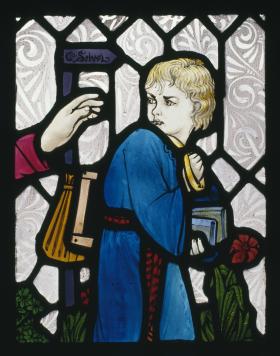Shakespeare's Seven Ages of Man
Students respond to a representation of the Seven Ages of Man depicted in a series of stained glass windows in the Shakespeare Room at the State Library of New South Wales.
Learning intention
Students are learning to:
- Creatively transform a Shakespearean soliloquy
- Experiment with appropriations and representations
- Investigate and experiment with extended metaphors and symbolism
Success criteria
Students will be successful when they can:
- Compose an appropriation of the 7 Ages of Man using extended metaphor and symbolism
- Create a visual representation
- Develop a unique extended metaphor
Student Activities
Appropriating the Seven Ages of Man
Students write a new version of the Seven Ages of Man speech that considers the Seven Ages of Women, before redesigning the Shakespeare Room's stained glass windows to reflect this change.


NSW Syllabus for the Australian Curriculum: English K-10
A student:
- EN5-RVL-01 uses a range of personal, creative and critical strategies to interpret complex texts
- EN5-URC-01 investigates and explains ways of valuing texts and the relationships between them
- EN5-URA-01 analyses how meaning is created through the use and interpretation of increasingly complex language forms, features and structures
Students will:
EN5-URA-01
- Analyse how figurative language and devices can be used to represent complex ideas, thoughts and feelings to contribute to larger patterns of meaning in texts, and experiment with this in own texts
EN5-RVL-01
- Use contextual cues to infer the meaning of unfamiliar or complex words
- Develop a deeper understanding of themes, ideas or attitudes by revisiting and reinterpreting texts to find new meaning
- Investigate how layers of meaning are constructed in texts and how this shapes a reader’s understanding and engagement
- Consider how the social, cultural and ethical positions represented in texts represent, affirm or challenge views of the world
EN5-URC-01
- Identify the process and value of adapting, appropriating or transforming texts for different audiences, purposes or contexts, and describe these processes in own texts
In each year of Stage 5 students must study examples of:
- visual texts
- media, multimedia and digital texts
Across the Stage, the selection of texts must give students experience of:
- Shakespearean drama
- a wide range of cultural, social and gender perspectives, popular and youth cultures
- an appropriate range of digital texts including film, media and multimedia
Learning across the curriculum
General Capabilities:
- creative and critical thinking
- literacy
- information and communication capability
- personal and social capability
Other learning across the curriculum areas:
- civics and citizenship
- difference and diversity
Background notes for teachers
The Mitchell Wing of the State Library of New South Wales is home to the Shakespeare Room. It is a beautifully decorated room built to commemorate the three hundredth anniversary of the death of William Shakespeare in 1616. The Shakespeare Room is filled with objects and books connected to the life and works of William Shakespeare.
One of the most beautiful art works in the room is a series of stained glass windows depicting images from a speech from Shakespeare's play As You Like It. The windows were created by Sydney stained glass artist Arthur G. Benfield. They were installed in 1942 during the construction of the building.
The windows depict the Seven Ages of Man, as described in the character Jaques’ soliloquy in As You Like It. In this comedy, Jaques is a melancholy lord who is living in the Forest of Arden after having been banished. He rarely takes part in the action around him, preferring to observe rather than to join in. In this speech Jaques first compares lives of men and women in the world to actors playing roles on a stage in the theatre. The speech then examines the changes that take place over the course of a man’s life.
Jaques divides the life of a man into seven stages:
- Baby or infant
- School boy or child
- Lover
- Soldier
- Justice or judge
- Old man
- Extreme old age, again like a child
Each of these stages is represented in a panel of the stained glass windows.
The idea of the Seven Ages of Man is very old and dates to the twelfth century (1100s). Shakespeare would have learnt about this idea as a young boy at school. Henry VIII owned a tapestry that featured the Seven Ages of Man.
The Seven Ages of Man
Speech from William Shakespeare’s As You Like It, Act II scene vii
Jaques: All the world's a stage,
And all the men and women merely players:
They have their exits and their entrances;
And one man in his time plays many parts,
His acts being seven ages. At first the infant,
Mewling and puking in the nurse's arms.
And then the whining school-boy, with his satchel
And shining morning face, creeping like snail
Unwillingly to school. And then the lover,
Sighing like furnace, with a woeful ballad
Made to his mistress' eyebrow. Then a soldier,
Full of strange oaths and bearded like the pard,
Jealous in honour, sudden and quick in quarrel,
Seeking the bubble reputation
Even in the cannon's mouth. And then the justice,
In fair round belly with good capon lined,
With eyes severe and beard of formal cut,
Full of wise saws and modern instances;
And so he plays his part. The sixth age shifts
Into the lean and slipper'd pantaloon,
With spectacles on nose and pouch on side,
His youthful hose, well saved, a world too wide
For his shrunk shank; and his big manly voice,
Turning again toward childish treble, pipes
And whistles in his sound. Last scene of all,
That ends this strange eventful history,
Is second childishness and mere oblivion,
Sans teeth, sans eyes, sans taste, sans everything.
Glossary
ballad: a story told through a song
capon: a castrated rooster, a luxury food
hose: stockings
lean: thin
mewling: crying or whining
modern instances: new judgements or decisions
oblivion: nothingness
pantaloon: refers to the sixth stage of life, the character of Pantalone is a weak old man from Italian comedy. Pantaloon was sixteenth century slang for an old man and is similar to “geezer”.
pard: a big cat such as a leopard or panther
pipe: a musical instrument like a recorder with a high pitched tone
puking: vomiting
sans: the French word for “without"
satchel: a school bag
severe: harsh or stern
treble: the high voice of a small boy
wise saws: wise sayings or proverbs
woeful: sad
Summary of the Seven Ages of Man speech
This monologue compares the world with a stage in a theatre. Men and women are the actors or players on this stage.
Actors playing roles have entrances and exits during a performance. Life also has its entrances and exits- people are born and die and pass in and out of our lives. Just as an actor plays a variety of roles in life, so too do men and women play different roles or pass through different stages or seven ages of their lives.
The speech then focuses on the experience of men. However it is also possible to consider how the lives of women might be divided into seven ages or stages.
The first role or stage is that of an infant or baby. The baby cries and whines before vomiting in the arms of his nurse.
In the second stage of life man plays the role of a small boy or child. He holds a school bag, has a shiny face and walks as slowly as he can because he does not like school and is reluctant to leave home.
The role of the lover is the third stage of life. He is young and foolish and falls passionately in love, singing a sad song about love in which he describes the beauty of a girl’s eyebrows.
In the fourth stage of life the man plays the role of the soldier. He has a beard, swears oaths and is ambitious to seek out honour. He is so keen to improve his reputation he is willing to risk dangers such as cannons in war.
In the fifth stage of life man plays the role of a justice or judge. He has grown fat from eating expensive meats. He uses his experience of life and the knowledge he has gained to offer what he thinks are wise sayings and advice and good decisions.
In the sixth stage of life the man becomes a pantaloon or weak old man. He is so thin his stockings become loose. The speech compares this stage of life to a return to being like a baby or child. Old men and small children both have high voices and are dependent on adults.
The seventh and final stage is extreme old age or a second childhood. Like babies very old men are dependent on others and have no teeth. The old man loses his memory, hearing and control of his senses before dying.